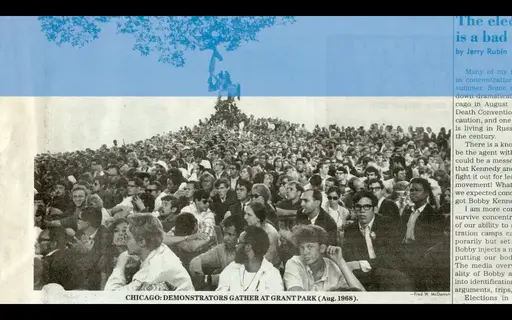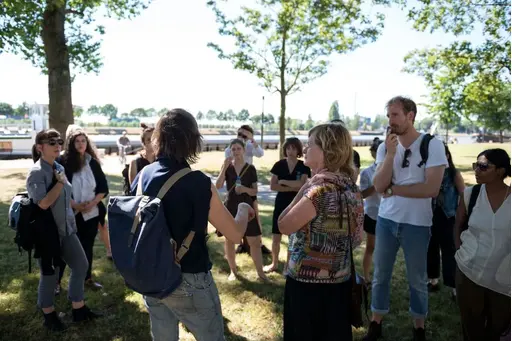
Propositions #6: The Temporary Institute for the Contemporary marks the culmination of a vibrant and inspiring 2017/2018 pilot year of the BAK Fellowship Program. Through conversations, readings, and performances, the BAK Fellows share insights into their respective artistic research itineraries. This sixth gathering in the series Propositions for Non-Fascist Living (2017–2020) takes the shape of an imagined “institute for the contemporary.” As a recurring temporary public “institute” by, for, with, and beyond the learning community at BAK, it will emerge with the conclusion of each Fellowship sequence.
Propositions #6 begins at 16 hrs in the Kanaleneiland neighborhood in Utrecht with an architecture walk by Wendelien van Oldenborgh. The program at BAK commences at 17.10 hrs and consists of installations, performances, lectures, and conversations with all BAK Fellows. The day concludes with a party.
With contributions by BAK 2017/2018 Fellows Isshaq Al-Barbary (writer and researcher, Bethlehem) and Diego Segatto (artist and educator, Bologna) of Campus in Camps; Sepake Angiama (educator and curator, Kassel); Matthijs de Bruijne (artist and union organizer, Amsterdam); Luigi Coppola (artist, Brussels and Lecce); Quinsy Gario (poet, theater-maker, and artist); Ola Hassanain (artist, Utrecht and Khartoum); Otobong Nkanga (artist, Antwerp); Wendelien van Oldenborgh (artist, Rotterdam); and Pelin Tan (sociologist and art historian, Mardin).
Propositions #6 takes place within the framework of the exhibition First Person Plural: Empathy, Intimacy, Irony, and Anger at BAK (12 May–22 July 2018).
To attend the performative conference, please go to Eventbrite to purchase your tickets (€5/€10 excluding administration fee). BAK offers without-cost solidarity passes to enable the participation of those who would otherwise be unable to afford a pass. If you are able, you can sponsor the solidarity fund along with the purchase of your own ticket.
A take-away dinner with delicious Ethiopian injeras prepared specially for this occasion is available between 18–22 hrs at our neighbor Restaurant Sunshine (Pauwstraat 11, € 8). Please join us to celebrate!
The BAK Fellowship Program, inaugurated in 2017, is a site for the development of talent and critical practice that advance the notion of art as a public sphere and a political space. BAK offers a unique environment for learning, research, and art-making, which evolves in concert with its public programs. Ten research positions are offered per (academic) year to Netherlands-based and international practitioners involved in contemporary arts, theory, and activisms.
The realization of this project has been made possible through financial contributions by the Dutch Ministry of Education, Culture and Science and the City Council, Utrecht.
BAK’s main partner in the field of education and research is HKU University of the Arts Utrecht.
Program
15.45–17.00
Housing the Ghosts of Possibilities
Wendelien van Oldenborgh
Walk, Kanaleneiland, Utrecht (registration closed)
Wendelien van Oldenborgh, together with Hanneke Oosterhof, conducts a walk in Kanaleneiland, where she proposes to speculatively experience the Utrecht neighborhood in relation to Bauhaus architect Lotte Stam-Beese’s work, in particular her learning from Socialist housing in Kharkiv and her city planning in Rotterdam. Kanaleneiland was planned by the Utrecht municipal city planning department, where Henk Eysbroek worked for two years following his time as assistant designer to Stam-Beese in Rotterdam. Stam-Beese was the head architect of Rotterdam’s post-WWII housing development. For Van Oldenborgh, such architecture poses pertinent questions about when the ideals of post-WWII Dutch housing meet the reality of colonial-modernist trauma; when designing for equality meets biased management and policy; and when daily livability meets the aesthetic and moral standards of dominant culture.
* Please arrive at Bakkerij de Molen, Bernadottenlaan 25, at 15.45 to facilitate a punctual start at 16.00. After the walk, the group will return to BAK with bus number 7. The cost of the ticket is €1,36.
17.10–17.40
Evolutionary Populations: Seeds of a World Waiting to Germinate
Luigi Coppola
Performative installation, foyer and exhibition space
Luigi Coppola’s ongoing research into “evolutionary populations” (varieties of seeds that crossbreed naturally, adapting to and being influenced by local soil and climate characteristics) began with the artist’s projects in Castiglione d’Otranto in southern Italy, and draws upon the knowledge of evolutionary plant-breeding by agronomist Salvatore Ceccarelli. Through participatory seed-breeding incentives in Syria and Italy, evolutionary populations of hard and soft wheat have been cultivated, and some of these were planted by Coppola last autumn on BAK’s rooftop. The successful growth of the wheat attests to the adaptability of such evolutionary populations to the local climatic conditions. During his performance, Coppola assembles the grain-bearing ears of the wheat grown at BAK into a geometric floor installation with red clay, creating a pattern that refers to the complexity of nature. This pattern is drawn as a map, which becomes part of Sepake Angiama’s installation We Summon All Beings Here, Present, Past, & Future for the remainder of the exhibition First Person Plural.
17.20–18.00
Housing the Ghosts of Possibilities
Wendelien van Oldenborgh
Script-reading and screening, auditorium
The script is compiled from fragments of various texts that Wendelien van Oldenborgh has encountered during her research into the voices and ideals of architect Lotte Stam-Beese and writer, editor, and fighter for equality Hermina Huiswoud. Though they never met, both women experienced the Soviet Union in the early 1930s and ended up influencing public life in the Netherlands in the 1950s. Stam-Beese was a major influence on Dutch post-WW II housing in her role as Chief Architect for Urban Planning for the Rotterdam Department for Urban Development and Reconstruction. Huiswoud, having edited the magazine The Negro Worker (1928–1937) and traveled the world for the Communist International (Comintern), became an active political voice for the Caribbean-Dutch community, notably through her close connection with artists from the Harlem Renaissance (poet, social activist, and playwright Langston Hughes amongst them). Both Stam-Beese’s thoughts on housing and Huiswoud’s struggles for racial and class equality were approached through the ideals and early practices of communism. For both women, love and friendship had a significant role in their life trajectory. A screening of research images occurs alongside a live reading of the script by the artist and three other readers. A continuous screening of the research images is viewable in Sepake Angiama’s installation We Summon All Beings Here, Present, Past, & Future for the remainder of the exhibition First Person Plural.
18.00–18.40
Palabras en Cambio: Subjective Words Within the Cuban Revolution
Matthijs de Bruijne and Cecilia Vallejos
Lecture and conversation, mezzanine
Matthijs de Bruijne and Cecilia Vallejos present excerpts of the digital publication Palabras en Cambio together with other material telling the story of the Cuban revolution to the present day. Palabras en Cambio consists of short stories from “self-employed” Cubans, compiled with articles from Cuba’s constitution. This booklet was conceived as a PDF in order to be distributed from person to person. During the lecture, excerpts of historical Cuban films and documentaries will be shown alongside the publication. The PDF-booklet, the films, and some texts are compiled on a memory stick, replicating the digital packages that circulate in the so-called “non-Internet” society of contemporary Cuba. To give the audience access to an in-depth reading of all content usually circulated via memory stick, a link to download the entire package, and a printed version of Palabras en Cambio (with a partial translation in English) are available after the lecture in Sepake Angiama’s installation We Summon All Beings Here, Present, Past, & Future.
18:10–18:50
Toward a Voluntary Exile: Unconditional Hospitality and Islands
Isshaq Al-Barbary and Diego Segatto (Campus in Camps) with Pelin Tan
Conversation, auditorium
Isshaq Al-Barbary and Diego Segatto of Campus in Camps engage Pelin Tan in a discussion about the possibilities for self-organized learning environments, wherein knowledge becomes a tool for liberation. Seeking to nourish new pedagogical forms born from “autonomous infrastructures,” they discuss the following questions: Is it possible to re-orient homogenous networks in the direction of non-standardized cultural plurality? How is knowledge shaped by the social fabric? How can multi-perspectival lived experiences of exile and non-belonging help (re-)build the sociocultural “meshwork” (Campus in Camps) that constitutes the global?
18:50–19:10
Hear Me Out: Audible Demands and Political Actions
Ola Hassanain
Performance, auditorium
Together with three Sudanese performers, Ola Hassanain brings to life audible demands that populate the contemporary political space of her country of origin. The performers start by softly humming, dispersed throughout the common spaces of BAK, before joining together in a collective formation. They chant and sing in both Arabic and English, projecting their own demands and aspirations into the frame of the present event. In Sudan, political actions carried out in “public space” are seen as a serious transgression of the state’s control; public space is posited as a “site of no protest.” Since 2013, demonstrations have been erupting all over Khartoum, demanding the removal of the Sudanese government; these are usually suppressed with extreme violence. Hear Me Out allows both tension and affinity to develop between the voices, becoming a “spatial conversation” that re-constitutes public space as a site of euphonic resistance.
18:50–19:15
…; Speaking of Borders
Quinsy Gario with Jörgen Gario, Gloria Holwerda-Williams, and Shaka Jean-David
Performative conversation, mezzanine
By way of a performative conversation, together with Jörgen Gario, Gloria Holwerda-Williams, and Shaka Jean-David, Quinsy Gario points to a decolonial kinship between the Leuven student uprising of January 1968, the 1967 rebellion in Detroit, and Patrice Lumumba’s 1960 independence speech. The conversation departs from a picture taken by Ron Kroon on 18 January 1968 of the Leuven Muurkrant [Wall Newspaper], in which students wrote: “Leuven moet een tweede Detroit worden!” [Leuven must become a second Detroit!] In addition to the identifiable lineage of student protests around Europe, the reference to the resistance of African-Americans to police brutality in Detroit places the Leuven uprising in a historical conversation that was explicitly anti-racist and against colonial violence. The Leuven uprising’s resonant international references are explored by considering language, colonial violence, religion, and the political role of archives.
With thanks to Humanity in Action for the additional production support.
19:45–20:15
Reading Out Loud: Letter from the Future
Sepake Angiama
Reading exercises, mezzanine
In May 2018, Sepake Angiama conducted the letter-writing workshop Letter from the Future, which asked the question “what would your future self write to your current self?” On the occasion of Propositions #6: The Temporary Institute for the Contemporary, these letters are read out loud by workshop participants themselves. Through the public reading of letters to the self, Angiama asks us questions about who we (think we) become, and how reading collectively can transform the act of reading itself. This exercise is a development toward the transposition of a collective political imaginary in the context of Angiama’s project We Summon All Beings Here Present, Past, & Future—a temporary installation space for screening, reading, reflection, and conversation that is part of the current BAK exhibition First Person Plural: Empathy, Intimacy, Irony, and Anger.
Following Angiama’s invitation to all 2017/2018 BAK Fellows, several contribute an element of their activities on 30 June 2018 to her installation. These contributions remain in place for the rest of the exhibition.
20:30–21:15
After First Light A Story to Tell
Otobong Nkanga
Lecture-performance, auditorium
Otobong Nkanga delves into fragments of history through the means of storytelling, objects, and voice. In this lecture-performance, specimens presented on metal plates as part of the piece Backstage (2015)—exhibited in the current BAK exhibition First Person Plural: Empathy, Intimacy, Irony, and Anger—are used as entry-points in order to reveal what goes on behind the scenes of the artist’s creative process. The mineral objects aid in excavating and unearthing existing entanglements along various historical lines, as well as in personal encounters and accounts.
21.15–23.30 hrs
DJ set by Wendelien van Oldenborgh
Auditorium
Download the handout with the program.
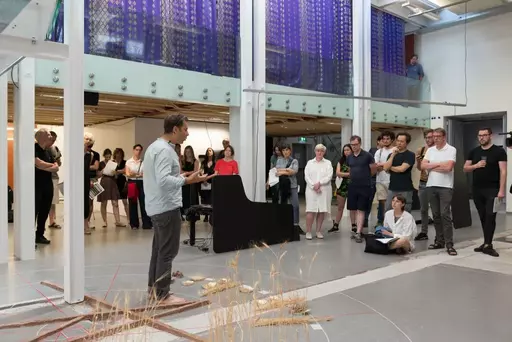
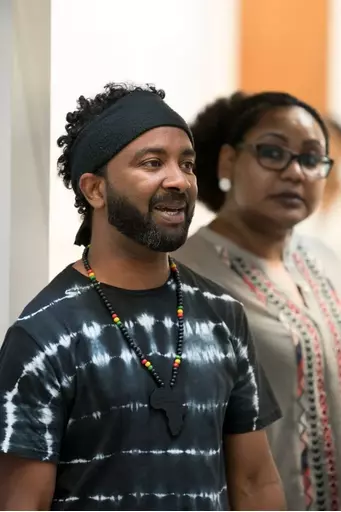
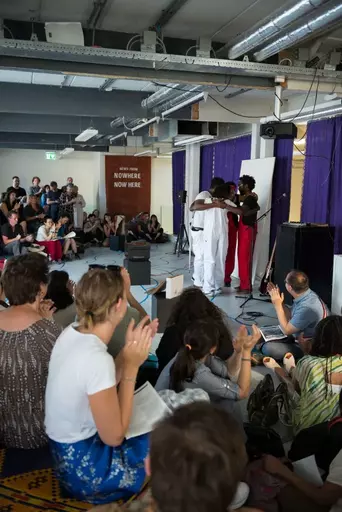
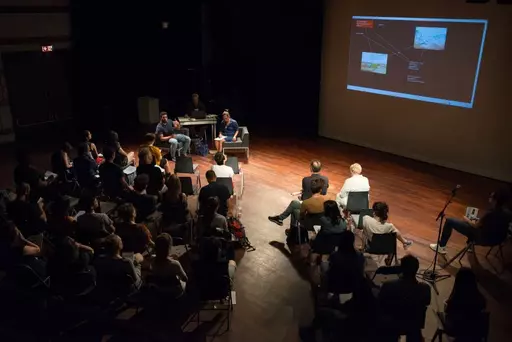
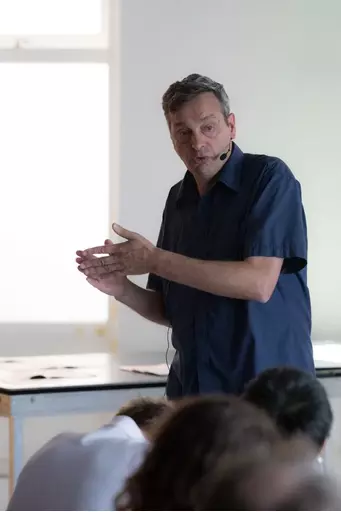
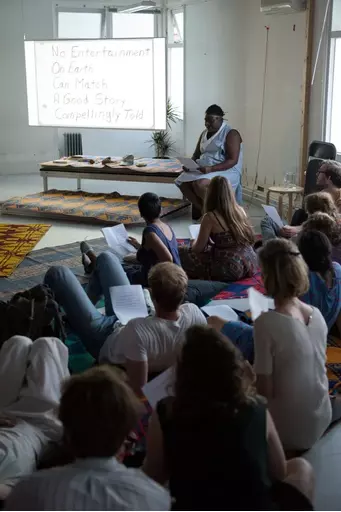
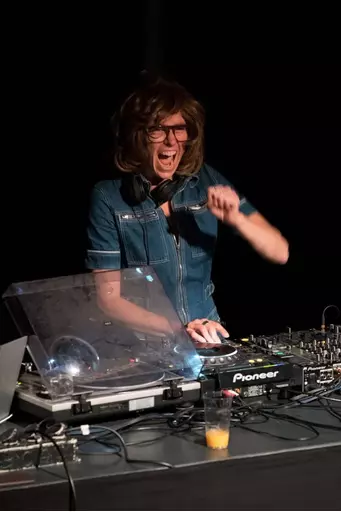
Long-Term ProjectPropositions for Non-Fascist LivingFirst Person Plural: Empathy, Intimacy, Irony, and AngerPropositions #6: The Temporary Institute for the Contemporary
related
